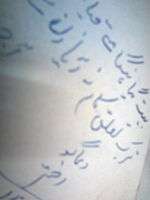Akhtar ul Iman
Akhtar ul Iman (1915–1996) was a noted Urdu poet and screenwriter in Hindi cinema, who had a major influence on modern Urdu nazm.[1][2]
Akhtar ul Iman اختر الایمان | |
|---|---|
| Born | Akhtar 12 November 1915 Qila Patthargarh, Najibabad, Bijnor district |
| Died | 9 March 1996 (aged 80) |
| Resting place | Bandra Qabristan, Mumbai Bandra East |
| Nationality | Indian |
| Education | Master of Arts in Urdu Literature |
| Alma mater | Zakir Husain Delhi College Aligarh Muslim University |
| Occupation | poet, screenwriter |
| Employer | Freelance and B.R. Films assigned cine writer (1960–1980) |
| Known for | Urdu Nazm, poet screenwriter and playwright |
| Home town | Najibabad,Bijnore |
| Spouse(s) | Sultana Iman |
| Children | One son and three daughters |
| Signature | |
 | |
He won the Filmfare Award for Best Dialogue in 1963 for Dharmputra and 1966 for Waqt. He was awarded the 1962 Sahitya Akademi Award in Urdu, for his Poetry Collection, Yadein (Memories), by Sahitya Akademi, India's National Academy of Letters.[3]
Early life and education
Born in Qila Patthargarh, Najibabad, in the Bijnor district of Uttar Pradesh in 1915.
He gained his initial education at Bijnor, where he came in contact with poet and scholar Khurshid ul Islam – who taught at Aligarh Muslim University – and developed a long association with Ralph Russell. He graduated from the (Zakir Husain College) in Delhi.[4]
Career
He preferred nazm over more popular ghazal as a mean of poetic expression. Akhtar ul Iman's language is "coarse and unpoetic". He uses "coarse" and mundane poetic expressions to make his message effective and realistic.[5]
He left behind a substantial legacy for new generation of poets to follow which explores new trends and themes in modern Urdu poetry giving a new direction to the modern and contemporary Urdu nazm with emphasis on philosophical humanism.[6]
Works
Books
• Iss Aabad Kharabe Mein (Urdu)-published by Urdu Academy, Delhi, India. Autobiography of a famous Urdu writer of India.
Poetry
He has published eight collections:
- Girdaab (1943)
- Aabjoo (1944-1945)
- Tareek Sayyara (1946–47)
- Yaden (1961)
- Bint-e-Lamhaat (1969)
- Naya Ahang (1977)
- Sar-o-Samaan (1982)
- Zameen Zameen (1983-1990)
Play
- Sabrang (1948): a one-verse play.
Translation and compilation by others
- Zamistan Sard Mehrika (Urdu)- Last Poetic Collection of an unforgettable Urdu poet. Compiled and edited by Sultana Iman and Bedar Bakht.
- Query of the Road – Selected Poems of Akhtar-ul-Iman with Extensive Commentary by Baidar Bakht
Indian cinema
His contribution to Hindi cinema is significant, keeping in mind the number of landmark and hit movies he has contributed as a script writer (dialogue, story and screenplay). His first landmark movie was Kanoon, which became a big hit despite the fact that it had no songs or comedy sequences. This achievement remains unparalleled in Hindi cinema. Other important movies to which he contributed as a script writer were Dharmputra (1961) – for which he received a filmfare award – Gumrah, Waqt, Patther ke Sanam, and Daagh.
The one movie which has his lyrics is Bikhare Moti.
Awards
Literary awards
- 1962: Sahitya Akademi Award – Urdu: Yadein (Poetry)
- Iqbal Samman
and Numerous other literary awards.
- Filmfare Award
- 1963: Best Dialogue: Dharmputra[7]
- 1966: Best Dialogue: Waqt
Filmography
- Vijay (1988) – writer
- Chor Police (1983) – writer
- Lahu Pukarega (1980) – director
- Do Musafir (1978) – writer
- Chandi Sona (1977) – writer
- Zameer (1975) – writer
- 36 Ghante (1974) – writer
- Roti (1974) – writer
- Naya Nasha (1973) – writer
- Bada Kabutar (1973) – writer
- Daag (1973) – writer
- Dhund (1973) – writer
- Joshila (1973) – writer
- Kunwara Badan (1973) – writer
- Dastaan (1972) – writer
- Joroo Ka Ghulam (1972) – writer
- Aadmi Aur Insaan (1969) – writer
- Chirag (1969) – writer
- Ittefaq (1969) – writer
- Aadmi (1968) – writer
- Hamraaz (1967) – writer
- Patthar Ke Sanam (1967) – writer
- Gaban (1966) – writer
- Mera Saaya (1966) – writer
- Phool Aur Patthar (1966) – writer
- Bhoot Bungla (1965) – writer
- Waqt (1965) – writer
- Shabnam (1964) – writer
- Yaadein (1964) – writer
- Aaj Aur Kal (1963) – writer
- Akeli Mat Jaiyo (1963) – writer
- Gumrah (1963) – writer
- Neeli Aankhen (1962) – writer
- Dharmputra (1961) – writer
- Flat No. 9 (1961) – writer
- Barood (1960) – writer
- Kalpana (1960) – writer
- Kanoon (1960) – writer
- Nirdosh (1950) – writer
- Actress (1948) – writer
- Jharna (1948) – writer
Further reading
- Akhtar Ul Iman by Ghulam Rizvi 'gardish'. Sahitya Akademi Publications. ISBN 81-260-0920-9.
References
- Encyclopaedia of Indian literature vol. 1 By various pages 120–121
- Akhtar ul-Iman An anthology of modern Urdu poetry, by Rafey Habib. Publisher: Modern Language Association (MLA), 2003. ISBN 0-87352-797-6. p. 109.
- Sahitya Akademi Award – Urdu Archived 16 September 2009 at the Wayback Machine Sahitya Akademi Award Official listings.
- Alumni Archived 10 December 2009 at the Wayback Machine Zakir Husain College Official website.
- Modern Indian Literature: An Anthology, by K. M. George, various, Sahitya Akademi
- Encyclopaedia of Indian literature vol. 1
- Awards IMDb
External links
- Akhtar ul Iman on IMDb
- Verses of Akhtarul Iman
- http://www.columbia.edu/itc/mealac/pritchett/00urduhindilinks/baidarbakht/mod06akhtar.pdf
- Nazm of Akhtarul Iman
- http://oldpoetry.com/oauthor/show/Akhtar-Ul-Iman
- http://urdulife.com/mushaira/poet.cgi?ara_akhtar_ul_iman (poetry recitation in his own voice)
- https://archive.is/20130118214443/http://www.chakpak.com/celebrity/akhtar-ul-iman/filmography/9950
- http://www.hindimovie.com/people/writers/Akhtar-ul-iman/filmography
- https://web.archive.org/web/20160314063627/http://movies.obuzz.com/celebrities/akhtaruliman
- http://www.geocities.com/kavitayan/akhtar.html (Archived 2009-10-24) (English translation of four poems)
- https://books.google.com/books?id=ObFCT5_taSgC&pg=PA120&lpg=PA120&dq=akhtar+ul+iman&source=web&ots=mUzV1uyQv9&sig=VdLt-QEZp2L_f35rOkLumnvFXVs#PPA120,M1
- Modern Indian Literature, an Anthology By K. M. George, Sahitya Akademi
- https://web.archive.org/web/20110717173430/http://www.urduzoom.com/categories.php?catid=31